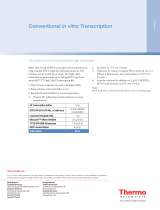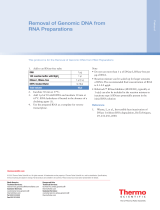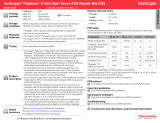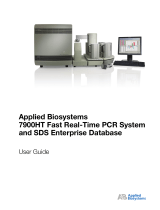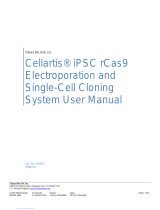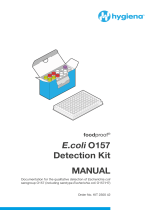
USER GUIDE Pub. No. MAN0016518 Rev. A.0
SuperScript™ IV One-Step RT-PCR System
Guidelines for RNA samples
∤This kit is optimized for use with 0.01 pg to 1 μg of total RNA, and is
compatible with total RNA, mRNA, viral RNA, or in vitro transcribed RNA.
∤High-quality, intact RNA is essential for RT-PCR, particularly for long targets.
RNA must be devoid of RNase contamination and handled using aseptic
conditions.
∤Isolate total RNA with TRIzol™ Reagent, the PureLink™ RNA Mini Kit, or the
MagMAX™-96 Total RNA Isolation Kit.
∤Determine RNA quality using a bioanalyzer or by agarose gel electrophoresis.
Guidelines for primers
∤Use gene-specic primers (GSPs) with the SuperScript™ IV One-Step RT-
PCR System. Oligo(dT) or random primers are not recommended, because
nonspecic products can be generated, thereby reducing the amount of target
RT-PCR product.
∤A nal concentration of 0.5 μM for each primer is recommended, but further
optimization may be necessary.
∤Design primers that anneal to the mRNA sequence in exons on both sides of an
intron or exon/exon boundary, to allow differentiation between the amplied
cDNA and potential contaminating genomic DNA. If this approach is not
feasible, use the protocol that involves residual gDNA removal with ezDNAse™
enzyme.
∤Ensure that primers are not self-complementary or complementary to each
other at the 3‘ ends.
∤To calculate primer Tm and estimate appropriate annealing temperatures for
PCR, use the Tm calculator at thermosher.com/tmcalculator
Limited product warranty
Important licensing information
These products may be covered by one or more Limited Use Label Licenses. By use of these
products, you accept the terms and conditions of all applicable Limited Use Label Licenses.
Disclaimer: TO THE EXTENT ALLOWED BY LAW, LIFE TECHNOLOGIES AND/OR ITS
AFFILIATE(S) WILL NOT BE LIABLE FOR SPECIAL, INCIDENTAL, INDIRECT, PUNITIVE,
MULTIPLE OR CONSEQUENTIAL DAMAGES IN CONNECTION WITH OR ARISING FROM THIS
DOCUMENT, INCLUDING YOUR USE OF IT.
Corporate entity: Life Technologies | Carlsbad, CA 92008 USA | Toll Free in USA 1.800.955.6288
©2017 Thermo Fisher Scientic Inc. All rights reserved. All trademarks are the property of Thermo
Fisher Scientic and its subsidiaries unless otherwise specied.
Package
contents
Catalog No.
12594025
12594100
12595025
12595100
Size
25 reaction
100 reaction
25 reaction (with ezDNase™ Enzyme)
100 reaction (with ezDNase™ Enzyme)
Kit
contents
Storage
conditions Store all contents at –20°C (non-frost-free)
Required
materials ∤Template: RNA
∤Gene specic primers (forward and reverse)
Timing ∤Preparation time: 5 minutes
∤Total cycling time: varies with target size (1–3.5 hours)
Product
description
∤The Invitrogen™ SuperScript™ IV One-Step RT-PCR System
is designed for sensitive end-point detection and analysis of
RNA by RT-PCR. The convenient formulation enables both
cDNA synthesis and PCR amplication to be performed in a
single reaction tube using gene-specic primers.
∤The system can amplify RNA targets up to 14 kb in length, and
is compatible with multiplex RT-PCR.
∤SuperScript™ IV RT Mix allows high efciency cDNA synthesis
due to high thermostability, processivity, and ability to
synthesize cDNA efciently from a variety of RNA samples.
∤2X Platinum™ SuperFi™ RT-PCR Master Mix contains
Platinum™ SuperFi™ DNA Polymerase which has high
specicity, offers high yield, and is ideally suited for PCR
applications that require sequence accuracy. The master mix
uses a buffer system optimized for both RT and PCR reactions
in the same tube.
∤ezDNase™ enzyme (available separately as Cat. No. 11766051)
is included with the SuperScript™ IV One-Step RT PCR System
with ezDNase™ Kits for protocols that require removal of
residual gDNA contamination.
Online
resources
Visit our product page for additional information and protocols.
For support, visit thermosher.com/support.
For Research Use Only. Not for use in diagnostic procedures.
Print options

-2-
27 July 2017
SuperScript™ IV One-Step RT-PCR System protocol
Step Action Procedure details
1 Program thermal cycler
Step Temp Time No. cycles
Reverse transcription 45–60°C 10 min 1
RT inactivation/initial denaturation 98°C 2 min
Amplification
98°C 10 s
35–40 [2]
55–72°C [1] 10 s
2°C 30 s/kb
Final extension 72°C 5 min 1
[1] IMPORTANT! Use the Tm calculator at thermofisher.com/tmcalculator to determine actual annealing temperature.
[2] Use 40 cycles for short (≤3 kb) templates only.
2
Prepare RT-PCR
reaction mix
a. Combine the following components in a 0.2-mL, nuclease-free, thin-walled PCR tube on ice.
Component Volume
2X Platinum™ SuperFi™ RT-PCR Master Mix 25 L
Forward primer (10 M) 2.5 L
Reverse primer (10 M) 2.5 L
SuperScript™ IV RT Mix [1] 0.5 L
Template RNA (0.01 pg to 1 g total RNA) varies
Nuclease-free water to 50 L
[1] Use all components except the SuperScript™ IV RT Mix for no RT control reactions.
b. Mix gently and ensure all the components are at the bottom of the amplification tube. Centrifuge briefly if needed.
3 Run thermal cycler Place the reaction in the pre-heated thermal cycler and run program set up in step 1.
Guidelines for cDNA synthesis and PCR
∤Keep all components, reaction mixes, and samples on ice.
∤After preparing reaction mixes, transfer them to the preheated thermal cycler and start the RT-PCR program.
∤The optimal conditions for RT-PCR depend on primer and target sequences.
∤Efcient cDNA synthesis can be accomplished by a 10-minute incubation at 45–60°C. A 50°C incubation is recommended as a general starting point.
∤For GC-rich or structurally complex RNA templates, increasing the cDNA synthesis incubation temperatures up to 55–60 °C may improve RT-PCR results.
∤Use 40 cycles of amplication for RT-PCR products ≤3 kb, and 35 cycles for RT-PCR products >3 kb.
∤For very low RNA input or rare targets, increasing the number of PCR cycles to 40 may improve results.
∤The PCR extension time varies with the size of the amplicon (recommended extension time is approximately 30 seconds per 1 kb of amplicon).
For support, visit thermosher.com/support.

-3-
27 July 2017
SuperScript™ IV One-Step RT-PCR System with ezDNase™ Enzyme protocol
Step Action Procedure details
1
Prepare gDNA digestion
reaction mix
Prepare a 10 L gDNA digestion reaction mix for each RT-PCR reaction. Mix the following components in a
0.2-mL, nuclease-free, thin-walled PCR tube on ice.
Component Volume
10X ezDNase™ Buffer 1 L
ezDNase™ Enzyme 1 L
Template RNA (0.01 pg to 1 g total RNA) varies
Nuclease-free Water to 10 L
2 5 min Digest gDNA
a. Gently mix and incubate at 37°C for 5 minutes.
b. (Optional) For long RT-PCR products (>3 kb) add 2 L of 13.2 mM EDTA, then incubate at 65°C for 10 minutes.
c. Briefly centrifuge the reaction mix and place the tube on ice.
3 Program thermal cycler
Step Temp Time No. cycles
Reverse transcription 45–60°C 10 min 1
RT inactivation/initial denaturation 98°C 2 min
Amplification
98°C 10 s
35–40 [2]
55–72°C [1] 10 s
2°C 30 s/kb
Final extension 72°C 5 min 1
[1] IMPORTANT! Use the Tm calculator at thermofisher.com/tmcalculator to determine actual annealing temperature.
[2] Use 40 cycles for short (≤3 kb) templates only.
4
Prepare RT-PCR
reaction mix
a. Combine the following components in the tube on ice containing the template RNA.
Component Volume
Template RNA (from step 2) 10 L
2X Platinum™ SuperFi™ RT-PCR Master Mix 25 L
Forward primer (10 M) 2.5 L
Reverse primer (10 M) 2.5 L
SuperScript™ IV RT Mix [1] 0.5 L
Nuclease-free water to 50 L
[1] Use all components except the SuperScript™ IV RT Mix for no RT control reactions.
b. Mix gently and ensure all the components are at the bottom of the amplification tube. Centrifuge briefly if needed.
5 Run thermal cycler Place the reaction in the pre-heated thermal cycler and run program set up in step 3.
For support, visit thermosher.com/support.
/
